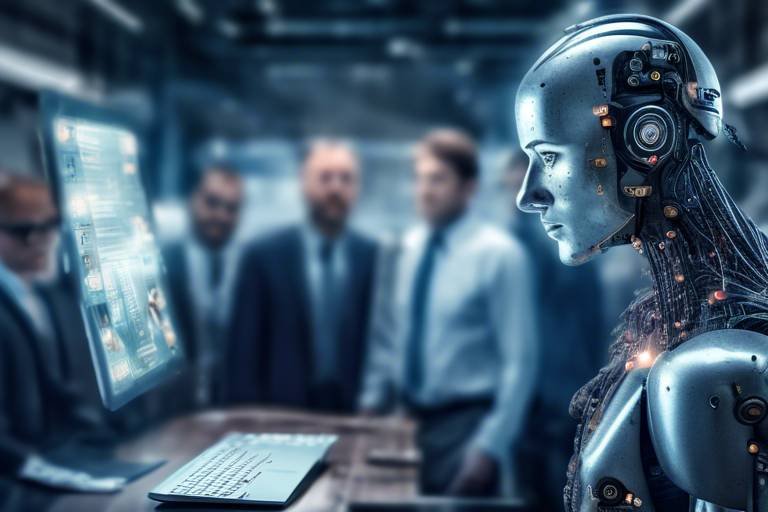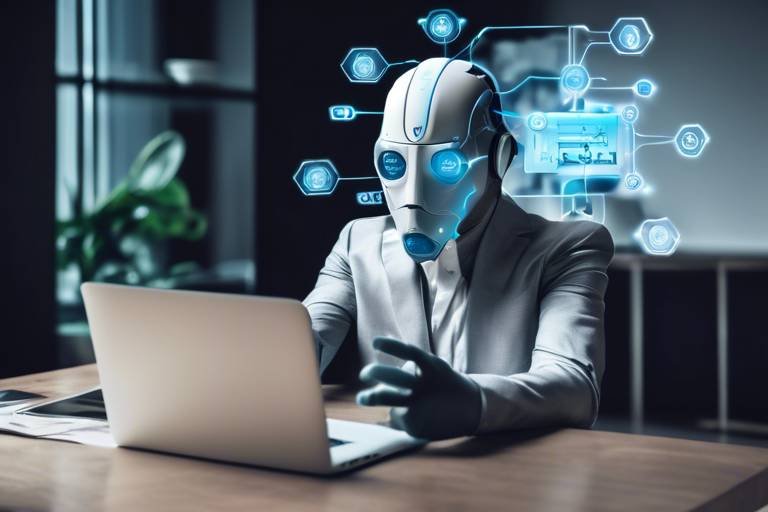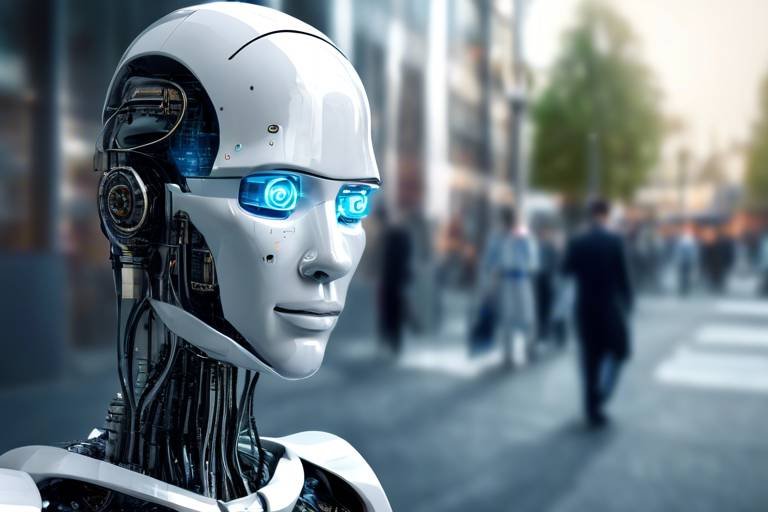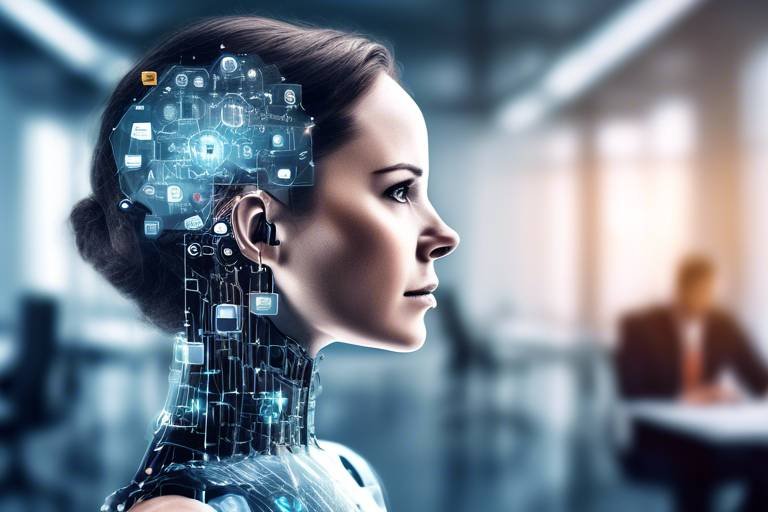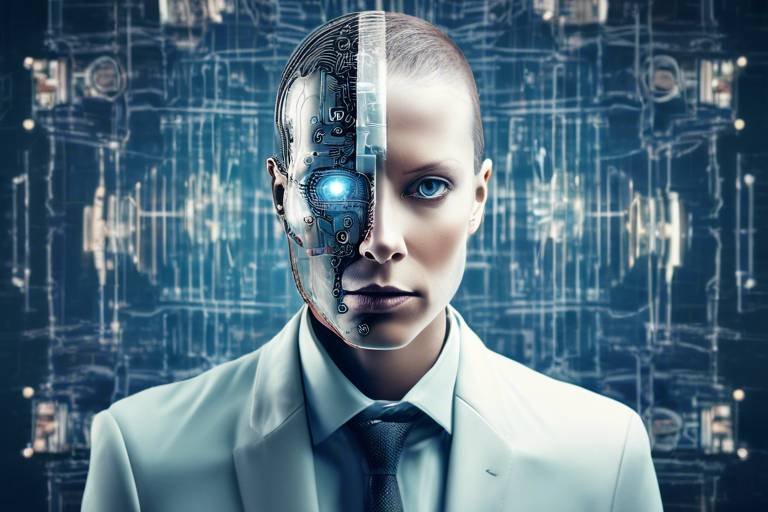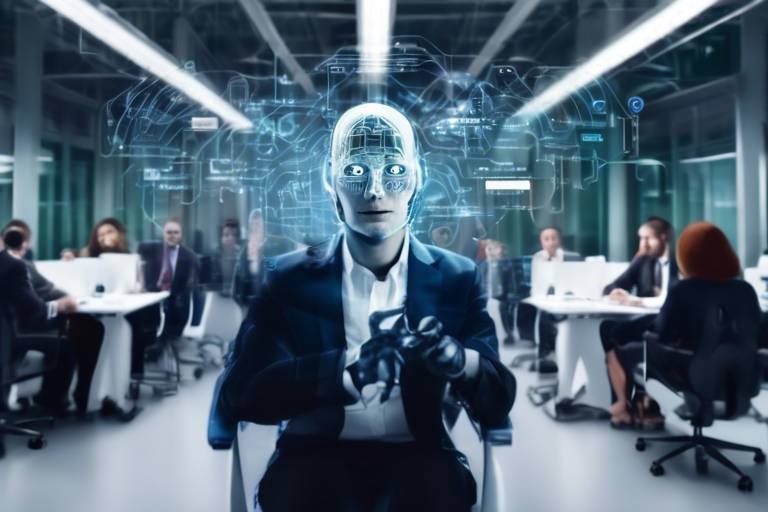Future Job Security in an AI Enabled Workforce
As we stand on the brink of a technological revolution, the question of job security in an AI-enabled workforce looms large. With the rapid advancement of artificial intelligence and automation, many individuals find themselves grappling with uncertainty about their future careers. Will robots take over jobs? Will human skills still hold value in a world dominated by machines? These questions are not just hypothetical; they are the reality we face today. The truth is, while AI is reshaping the workforce landscape, it also opens up a myriad of opportunities for those willing to adapt and evolve.
Imagine walking into an office where AI systems handle mundane tasks, allowing employees to focus on creativity and strategic thinking. This scenario isn't far-fetched; it's already happening in various industries. From manufacturing to healthcare, AI is streamlining processes and enhancing productivity. However, this shift comes with its own set of challenges. Job displacement is a significant concern, as automation can replace roles that involve repetitive tasks. Yet, it's essential to remember that with every job lost, new opportunities emerge. The key lies in understanding this dynamic and preparing for the changes ahead.
To navigate the future job market effectively, individuals must be proactive. This involves not only recognizing the impact of AI on employment but also identifying the skills that will be in demand. As we delve deeper into the implications of AI, we will explore the essential competencies needed to thrive in this evolving landscape. From technical skills like programming and data analysis to soft skills such as adaptability and communication, a well-rounded skill set will be crucial for success.
Moreover, the necessity for continuous learning cannot be overstated. In a world where technology evolves at lightning speed, staying relevant means committing to lifelong education. This commitment to upskilling will empower workers to transition smoothly into new roles that AI creates, ensuring they remain valuable contributors to their organizations.
As we explore the relationship between AI and employment, it's crucial to recognize that this transformation is not a zero-sum game. While some jobs may be displaced, AI also has the potential to create entirely new roles that we can't even imagine yet. By embracing change and preparing for the future, individuals can position themselves for success in an AI-enabled workforce.
- Will AI take away all jobs? While AI will automate certain tasks, it will also create new job opportunities that require human skills.
- What skills should I develop to stay relevant? Focus on both technical skills, like programming, and soft skills, such as communication and adaptability.
- How can I prepare for a career in an AI-driven world? Commit to lifelong learning and seek out training in emerging technologies and soft skills.
- Are there industries that will be more affected by AI? Yes, industries such as manufacturing, retail, and transportation are likely to see significant changes.

The Impact of AI on Employment
As we stand on the brink of a technological revolution, the impact of artificial intelligence (AI) on employment is a hot topic that sparks both excitement and concern. With machines increasingly capable of performing tasks that were once the exclusive domain of humans, we find ourselves asking: What does this mean for our jobs? Are we heading towards a future where robots take over, leaving many of us unemployed? Or can we adapt and thrive in this new landscape?
The reality is that AI is reshaping the workforce in profound ways. On one hand, automation can lead to job displacement, particularly in sectors like manufacturing, customer service, and data entry, where repetitive tasks can be easily automated. For instance, a factory that once employed hundreds of assembly line workers may now operate with a fraction of that workforce thanks to robotic automation. However, it's not all doom and gloom. While some jobs will inevitably vanish, AI also has the potential to create new opportunities that we can't even fathom yet.
To illustrate this point, consider the following table that showcases the dual nature of AI's impact on employment:
| Impact | Examples |
|---|---|
| Job Displacement | Manufacturing, Retail, Data Entry |
| Job Creation | AI Ethics Consultant, Data Scientist, Automation Specialist |
As we delve deeper into this topic, it's crucial to recognize that the relationship between AI and employment is not a simple one. It’s layered and complex, with both job creation and displacement occurring simultaneously. This dichotomy raises an important question: How can we prepare for these changes? Understanding the dynamics of this evolving landscape is essential for anyone looking to navigate the future job market effectively.
Moreover, the sectors most affected by AI are not just limited to traditional industries. Fields such as healthcare, finance, and even creative industries like marketing are undergoing transformations driven by AI technology. For example, AI can analyze vast amounts of data to predict patient outcomes in healthcare or optimize marketing strategies in real-time. As a result, the demand for skilled professionals who can harness these technologies is on the rise.
In conclusion, while the impact of AI on employment presents challenges, it also opens doors to new possibilities. By understanding the changes that are occurring and preparing for them, we can position ourselves to take advantage of the opportunities that AI brings. So, as we move forward, let’s embrace the future with an open mind and a readiness to adapt.

Skills for the AI-Driven Future
In a world where technology is evolving at breakneck speed, the skills required to thrive in the job market are also changing. The advent of artificial intelligence (AI) has shifted the landscape, making it crucial for individuals to adapt and enhance their skill sets. So, what does this mean for you? Well, it means that staying relevant is no longer just a nice-to-have; it's a necessity. As we delve into the skills needed for an AI-driven future, it’s important to understand that both technical and soft skills will play pivotal roles in shaping your career path.
First and foremost, let’s talk about technical skills. These are the hard skills that involve specific knowledge and expertise in areas such as programming, data analysis, and machine learning. As organizations increasingly rely on AI to automate processes and analyze data, the demand for professionals who can navigate these technologies will skyrocket. For instance, proficiency in programming languages like Python or R is becoming essential, as these languages are often used in AI development and data manipulation. But it’s not just about knowing how to code; understanding data structures, algorithms, and even basic statistics can significantly enhance your employability. Imagine being the go-to person in your company for all things data-related—sounds appealing, right?
However, let’s not forget about the importance of soft skills. While technical prowess is undeniably valuable, interpersonal skills such as communication, teamwork, and adaptability will be equally crucial in an AI-driven environment. Think about it: as AI takes over repetitive tasks, the human element becomes more significant. Employers will seek individuals who can collaborate effectively with AI systems and other team members. For example, being able to articulate complex ideas clearly to both technical and non-technical stakeholders is a skill that will set you apart. Additionally, adaptability will be key; as roles evolve and new technologies emerge, being open to change and willing to learn will be your best assets.
Moreover, the concept of continuous learning cannot be overstated. The job market is dynamic, and the skills that are in demand today may not be relevant tomorrow. This is where lifelong education comes into play. Whether through online courses, workshops, or even informal learning through networking, the ability to upskill and reskill will be vital. Consider setting a personal goal to learn something new every few months, whether it’s a new programming language or a management skill. This proactive approach will not only keep you ahead of the curve but will also instill a growth mindset that is essential in an AI-enhanced world.
In conclusion, navigating the future job market in an AI-enabled world requires a balanced blend of both technical and soft skills. By investing in your skill development and embracing a mindset of continuous learning, you can position yourself as a valuable asset in any organization. Remember, the future is not just about technology; it’s about how we, as humans, can work alongside it to create better outcomes.
- What are the most important technical skills for the future? Technical skills such as programming, data analysis, and understanding AI algorithms are crucial for future job security.
- How can I improve my soft skills? Engaging in team projects, seeking feedback, and practicing effective communication can significantly enhance your soft skills.
- Is continuous learning really necessary? Yes, continuous learning is essential to keep up with the rapid changes in technology and job requirements.

Technical Skills
In today's rapidly evolving job market, have emerged as a crucial asset for individuals aiming to thrive in an AI-enabled workforce. As automation and artificial intelligence continue to reshape the landscape of employment, the demand for specific technical competencies is skyrocketing. But what exactly are these skills, and why are they so important? Think of technical skills as the tools in a toolbox; without the right tools, you simply cannot get the job done.
Among the most sought-after technical skills are programming languages such as Python, Java, and JavaScript. These languages serve as the backbone for developing AI applications and automating processes. For example, Python is particularly favored for its simplicity and versatility, making it an excellent choice for data analysis and machine learning projects. Furthermore, data analysis skills have become increasingly vital. Companies are inundated with data, and the ability to interpret and draw insights from this data can set you apart from the competition.
But it doesn’t stop there. Familiarity with cloud computing platforms like AWS or Azure is becoming essential, as businesses shift to cloud-based solutions for scalability and efficiency. Additionally, knowledge of machine learning algorithms and frameworks can significantly enhance your employability. As AI technology becomes more sophisticated, understanding how to implement these algorithms is invaluable.
To illustrate the importance of these technical skills, let’s take a look at a table that outlines some of the most in-demand technical competencies in the job market today:
| Technical Skill | Description | Industries Affected |
|---|---|---|
| Programming Languages | Languages like Python and Java used for software development and automation. | Tech, Finance, Healthcare |
| Data Analysis | Skills in interpreting complex data sets to inform business decisions. | Marketing, E-commerce, Logistics |
| Cloud Computing | Knowledge of cloud services for scalable data storage and processing. | IT, Retail, Education |
| Machine Learning | Understanding of algorithms that enable systems to learn from data. | Tech, Automotive, Robotics |
While technical skills are undeniably critical, it’s essential to remember that they are not the only factor in career success. The interplay between technical know-how and soft skills—like communication and teamwork—creates a well-rounded professional profile that employers seek. In the end, mastering these technical skills will not only enhance your employability but also empower you to adapt to the ever-changing demands of the job market.
- What technical skills are most important for the future?
Programming languages, data analysis, cloud computing, and machine learning are among the most critical technical skills for the future job market.
- How can I acquire these technical skills?
Online courses, coding boot camps, and university programs are excellent resources for learning these skills.
- Are soft skills still relevant in an AI-driven workforce?
Absolutely! Soft skills like communication and adaptability are essential for working effectively in teams and navigating changes in the workplace.

Soft Skills
In today's fast-paced, AI-driven world, the importance of cannot be overstated. While technical abilities like programming and data analysis are essential, it's the soft skills that often set candidates apart in the job market. Think of soft skills as the glue that holds everything together; they enhance teamwork, improve communication, and foster a positive work environment. So, what exactly are these elusive soft skills that everyone keeps talking about?
First off, let’s talk about communication. In an age where collaboration often happens over digital platforms, being able to articulate your thoughts clearly and effectively is invaluable. Whether you're presenting a new idea to your team or negotiating a project deadline, the ability to communicate well can make or break your success. Imagine trying to build a bridge without clear instructions—chaos would ensue! Similarly, poor communication in the workplace can lead to misunderstandings and project failures.
Next up is adaptability. The only constant in life is change, right? This is especially true in the workplace where AI technologies are evolving at lightning speed. Employees who can pivot quickly and embrace new tools, processes, or even job roles will thrive. Think of adaptability as your personal survival kit in the jungle of the modern job market. The more versatile you are, the better equipped you'll be to tackle whatever comes your way.
Moreover, let’s not forget about emotional intelligence. This is the ability to understand and manage your emotions, as well as those of others. In an AI-enabled workforce, where machines may handle many technical tasks, the human touch becomes ever more critical. Emotional intelligence can enhance teamwork and foster a more cohesive work environment. It’s like being the conductor of an orchestra; you need to ensure that each musician is in sync to create beautiful music.
Now, you might be wondering how you can develop these soft skills. Here are a few strategies:
- Practice Active Listening: Engage fully in conversations and show genuine interest in others' perspectives.
- Seek Feedback: Regularly ask for constructive criticism from peers and supervisors to improve your communication style.
- Participate in Team Projects: Collaborating with others is a great way to hone your adaptability and teamwork skills.
In conclusion, while technical skills will undoubtedly open doors, it's the soft skills that will help you walk through them. As we move deeper into an AI-enabled workforce, remember that your ability to communicate, adapt, and connect with others will be the key to not just surviving, but thriving in your career.
Q: What are soft skills?
A: Soft skills are personal attributes that enable someone to interact effectively and harmoniously with other people. They include communication, teamwork, adaptability, and emotional intelligence.
Q: Why are soft skills important in an AI-driven workforce?
A: As automation takes over many technical tasks, soft skills become crucial for roles that require human interaction, creativity, and emotional intelligence, which machines cannot replicate.
Q: How can I improve my soft skills?
A: You can improve soft skills through practice, seeking feedback, participating in team activities, and engaging in self-reflection to understand your strengths and weaknesses.

Continuous Learning
In today's fast-paced world, the concept of has become more crucial than ever. With the rapid advancements in technology, especially in the realm of artificial intelligence, it's essential to keep our skills updated to remain relevant in the job market. Imagine trying to navigate a bustling city without a map; that's what it feels like to face an evolving workforce without the right knowledge and skills. Continuous learning acts as your GPS, guiding you through the complexities of new technologies and methodologies.
One of the most significant challenges many face is the fear of falling behind. This fear can be paralyzing, but it also serves as a powerful motivator. Embracing a mindset of lifelong learning not only helps in overcoming this fear but also opens doors to new opportunities. Whether you're a seasoned professional or just starting your career, the ability to learn and adapt is your greatest asset. Think of it as a toolkit; the more tools you have, the better equipped you are to tackle any job that comes your way.
To thrive in an AI-driven environment, individuals should focus on various aspects of continuous learning. This includes:
- Formal Education: Pursuing degrees or certifications in relevant fields can provide a solid foundation.
- Online Courses: Platforms like Coursera, Udacity, and LinkedIn Learning offer a plethora of courses tailored to current industry needs.
- Workshops and Seminars: Engaging in hands-on experiences can enhance practical knowledge and skills.
- Networking: Connecting with professionals in your field can provide insights into trending skills and knowledge.
Moreover, organizations are recognizing the importance of fostering a culture of continuous learning. Companies that invest in their employees' education not only see improved performance but also higher employee satisfaction and retention rates. It's a win-win situation! By providing access to training programs and encouraging upskilling, businesses can create a workforce that is not only competent but also enthusiastic about growth.
In conclusion, the need for continuous learning is not just a trend; it's a necessity in the age of AI. By committing to lifelong education, individuals can not only secure their job positions but also pave the way for exciting new career paths. So, ask yourself: Are you ready to invest in your future? The time to start learning is now!
- What is continuous learning? Continuous learning refers to the ongoing, voluntary, and self-motivated pursuit of knowledge for personal or professional development.
- Why is continuous learning important in an AI-driven workforce? It helps individuals stay relevant, adapt to new technologies, and enhances career opportunities in a rapidly changing job market.
- How can I start my continuous learning journey? You can begin by identifying areas of interest, enrolling in online courses, attending workshops, and networking with professionals in your field.
- Are there free resources for continuous learning? Yes, many platforms offer free courses, webinars, and resources. Websites like edX, Khan Academy, and YouTube are great starting points.

Adapting to Automation
As we stand on the brink of a technological revolution, the ability to adapt to automation is becoming more crucial than ever. Imagine waking up one day to find that the job you’ve held for years has been replaced by a machine. It sounds daunting, right? But here's the catch: adapting to automation doesn't mean you have to fight against it; rather, it's about learning to work alongside it. Embracing this shift can open doors to new opportunities that we might not even be aware of yet.
First, let's consider the **mindset shift** required here. Instead of viewing automation as a threat, think of it as a tool that can enhance your productivity and efficiency. For instance, if you're in a manufacturing role, automation might take over repetitive tasks, allowing you to focus on more complex and rewarding aspects of your job. This transition requires a willingness to learn and evolve. It’s like upgrading your smartphone; the new features may seem intimidating at first, but once you get the hang of them, you wonder how you ever lived without them!
Next, honing your skills is essential. Automation often leads to a demand for new roles that require different competencies. To stay relevant, you should consider the following strategies:
- Upskill: Invest time in learning new technologies related to your field. Online courses, workshops, and certifications can be invaluable.
- Network: Connect with professionals in your industry who are also navigating this change. Sharing experiences and insights can provide you with new perspectives and ideas.
- Be Flexible: The ability to pivot and take on new responsibilities will be a significant asset. Employers value adaptability in an ever-changing work environment.
Moreover, companies are increasingly looking for employees who can bridge the gap between technology and human interaction. This means that while technical skills are essential, your ability to communicate effectively and collaborate with others will set you apart. Think of it this way: in a world where machines handle data processing, your role might shift to interpreting that data and making strategic decisions based on it. This is where your soft skills will shine!
Lastly, remember that the journey of adapting to automation is not a sprint; it’s a marathon. Continuous learning is key. Just as athletes train consistently to improve their performance, you should regularly seek opportunities to enhance your skills. Whether through formal education or self-directed learning, staying curious and open-minded will help you navigate the complexities of an automated workforce.
In conclusion, adapting to automation is not just about surviving; it's about thriving in a new environment. By embracing change, investing in your skills, and fostering a growth mindset, you can position yourself as an invaluable asset in the AI-driven future. So, are you ready to take that leap?
Q1: Will automation completely take away all jobs?
A1: While automation may displace certain jobs, it also creates new roles and opportunities. The key is to adapt and learn new skills to stay relevant.
Q2: What skills should I focus on developing?
A2: Focus on both technical skills, such as programming and data analysis, and soft skills, like communication and adaptability, to thrive in an automated environment.
Q3: How can I continuously learn and upskill?
A3: Consider online courses, workshops, and networking with industry professionals to stay updated on the latest trends and technologies.

Job Creation vs. Job Displacement
The relationship between artificial intelligence (AI) and employment is a complex tapestry woven with threads of both opportunity and uncertainty. As we stand on the brink of a new era, it’s essential to recognize that while AI is indeed a catalyst for job displacement, it also serves as a powerful engine for job creation. The question then arises: how do we balance these two forces? Understanding this dynamic is critical for workers, employers, and policymakers alike in navigating the future job landscape.
On one hand, AI technologies can automate routine tasks, leading to the elimination of certain roles, particularly in sectors like manufacturing, data entry, and customer service. For instance, a simple chatbot can handle thousands of customer inquiries, reducing the need for human operators. However, this does not mean the end of jobs altogether; rather, it signifies a shift in the nature of work. As mundane tasks are automated, new roles emerge that require higher levels of cognitive skills, creativity, and emotional intelligence.
Consider this: while a factory worker may find their assembly line job at risk due to automation, new opportunities arise in fields such as robotics maintenance, AI programming, and data analysis. These roles demand a different skill set, one that is more aligned with the technological advancements we are witnessing. In fact, a recent study by the World Economic Forum projected that by 2025, AI could displace 85 million jobs, but it could also create 97 million new roles. This is a classic case of the phoenix rising from the ashes—where the old gives way to the new.
To better illustrate this concept, let’s take a closer look at how job creation and displacement can coexist. Below is a table that highlights some industries and their projected outcomes:
| Industry | Jobs Displaced | Jobs Created |
|---|---|---|
| Manufacturing | 5 million | 3 million |
| Healthcare | 1 million | 2 million |
| Information Technology | 500,000 | 4 million |
| Retail | 2 million | 1 million |
This table underscores the reality that while certain sectors may face significant job losses, others are poised for growth. It’s like a game of musical chairs—some may lose their seats, but new chairs are being added for those who adapt and evolve. The key is to recognize which skills will be in demand and to prepare accordingly.
Moreover, the emergence of AI has led to the creation of entirely new sectors that didn’t exist a decade ago, such as AI ethics, machine learning engineering, and data privacy consulting. These professions require specialized knowledge and skills, creating a demand for education and training programs that can equip the workforce for these roles. Individuals and organizations must embrace the reality of a shifting job market and invest in the necessary resources to stay relevant.
In conclusion, the dialogue around job creation and displacement in the age of AI is not a simple one. It’s a multifaceted issue that requires a proactive approach from all stakeholders. By focusing on education, upskilling, and adaptability, we can ensure that the workforce is not only prepared for the challenges of automation but is also ready to seize the opportunities it presents. As we navigate this new terrain, let’s remember that every challenge is an opportunity in disguise, waiting for those brave enough to embrace it.
- Will AI take away all jobs? No, while AI will automate some jobs, it will also create new roles that require different skills.
- What skills should I focus on to remain employable? Focus on both technical skills like programming and data analysis, and soft skills like communication and adaptability.
- How can I prepare for future job changes? Engage in continuous learning and upskilling to stay relevant in your field.
- Which industries are likely to grow due to AI? Industries such as healthcare, IT, and AI ethics are expected to see significant growth.

Emerging Job Roles
As we dive deeper into the era of artificial intelligence, it's fascinating to see how the job market is evolving. New technologies are not just replacing old roles; they're also creating entirely new positions that we could barely imagine a decade ago. The emergence of AI has given rise to a plethora of job opportunities, many of which are centered around the integration of technology and human skills. For instance, roles such as AI Ethicist and Data Curator are becoming increasingly vital. These positions require a unique blend of technical knowledge and ethical considerations, ensuring that AI systems are developed and implemented responsibly.
Another exciting area is Machine Learning Engineer, where professionals are not just coding but also working on algorithms that allow machines to learn from data. This role is crucial as businesses seek to harness the power of predictive analytics and personalized customer experiences. Furthermore, the demand for AI Trainers is on the rise. These individuals are responsible for teaching AI systems how to understand human behavior and language, making them indispensable in the development of more intuitive AI interfaces.
Moreover, we can't overlook the importance of Cybersecurity Analysts in this new landscape. As AI technologies advance, so do the threats associated with them. Cybersecurity experts are needed to protect sensitive data and ensure that AI systems are secure from malicious attacks. In addition, roles like Robotics Coordinator are emerging, focusing on the management and maintenance of automated systems in various industries, from manufacturing to healthcare.
In essence, the job roles of the future will not only require technical expertise but also a strong understanding of human interaction and ethical implications. To prepare for these roles, individuals should focus on developing both their technical and soft skills, making them versatile and adaptable in a rapidly changing environment. The integration of AI into our daily work lives is not just a challenge; it’s an opportunity to redefine what work looks like and how we engage with technology.
- What are some of the most promising job roles emerging from AI?
Some promising roles include AI Ethicist, Machine Learning Engineer, Data Curator, Cybersecurity Analyst, and Robotics Coordinator.
- How can I prepare for these emerging roles?
Focusing on acquiring both technical skills, such as programming and data analysis, as well as soft skills like communication and adaptability is essential.
- Will AI replace all jobs in the future?
While AI may displace some jobs, it will also create new opportunities that require a human touch, ensuring a balance between automation and human labor.
- What industries will see the most job creation due to AI?
Industries like healthcare, finance, and manufacturing are expected to see significant job creation as they integrate AI technologies.

Industries Most Affected
As the wave of artificial intelligence continues to surge forward, various industries are experiencing seismic shifts in their operational landscapes. Some sectors are more vulnerable to the effects of AI and automation than others. For instance, the manufacturing industry, which has long been associated with repetitive tasks, is increasingly incorporating AI-driven robots to enhance efficiency and reduce costs. These machines can perform tasks with precision and speed, leading to a significant reduction in the need for human labor. This transformation raises pressing questions: What does this mean for the workforce? How can workers adapt to these changes?
Another sector feeling the heat is retail. With the rise of e-commerce and AI-driven customer service solutions like chatbots, traditional retail jobs are being redefined. Workers may find themselves transitioning from in-store roles to positions that require managing online sales platforms or overseeing AI systems. The ability to understand and leverage technology is becoming increasingly valuable in this space.
In the transportation industry, the advent of autonomous vehicles poses a significant threat to jobs. Truck drivers, taxi operators, and delivery personnel may find their roles diminished as companies invest in self-driving technology. However, this disruption also opens doors for new opportunities in fields like vehicle maintenance and AI system management, which require a different skill set.
| Industry | Impact of AI | New Opportunities |
|---|---|---|
| Manufacturing | Increased automation leading to job displacement | Robot maintenance, programming |
| Retail | Shift towards e-commerce, reduced in-store roles | Online sales management, AI customer service |
| Transportation | Rise of autonomous vehicles reducing driver jobs | Vehicle tech support, AI system oversight |
Additionally, the finance sector is also undergoing a transformation. With AI algorithms capable of analyzing vast amounts of data, tasks such as risk assessment and fraud detection are increasingly being automated. This shift not only threatens traditional roles like bank tellers but also creates demand for professionals who can interpret AI-generated insights and manage these systems effectively.
Lastly, the healthcare industry, while benefiting from AI advancements in diagnostics and patient management, is also facing challenges. AI can assist in analyzing medical data and predicting patient outcomes, but it may also lead to a reduction in certain administrative roles. Healthcare professionals will need to adapt by enhancing their tech skills and understanding how to work alongside AI systems.
In summary, while some industries face significant job displacement due to AI, they are also paving the way for new roles that require a different skill set. The key for workers is to remain adaptable and proactive in acquiring the necessary skills to thrive in this evolving landscape.
- Will AI completely replace human jobs?
While AI will automate certain tasks, it is also expected to create new roles, requiring humans to adapt and learn new skills. - What skills should I develop to stay relevant in the job market?
Focus on both technical skills, like programming and data analysis, and soft skills, such as communication and adaptability. - How can I prepare for a career in an AI-driven industry?
Engage in continuous learning through online courses, workshops, and networking with professionals in the field.
Frequently Asked Questions
- Will AI really take away my job?
It's a common fear, but the reality is a bit more nuanced. While AI and automation may displace certain roles, they also create new job opportunities. The key is to adapt and acquire the skills that will be in demand in an AI-enabled workforce.
- What skills should I focus on for future job security?
To thrive in the evolving job market, you should focus on a mix of technical skills, like programming and data analysis, and soft skills, such as communication and adaptability. Continuous learning is essential, so consider taking courses or attending workshops to stay ahead.
- How can I prepare for the changes brought by AI?
Start by assessing your current skills and identifying gaps. Embrace lifelong learning through online courses, certifications, and networking. Staying informed about industry trends can also help you pivot your career as needed.
- Are there specific industries that are more affected by AI?
Yes, industries like manufacturing, retail, and transportation are experiencing significant changes due to AI. However, sectors like healthcare and technology are also evolving, creating new roles that require human expertise alongside AI tools.
- What are some emerging job roles due to AI advancements?
New roles such as AI trainers, data ethicists, and automation specialists are emerging. These positions require a blend of technical knowledge and an understanding of ethical implications, making them crucial in the AI landscape.

